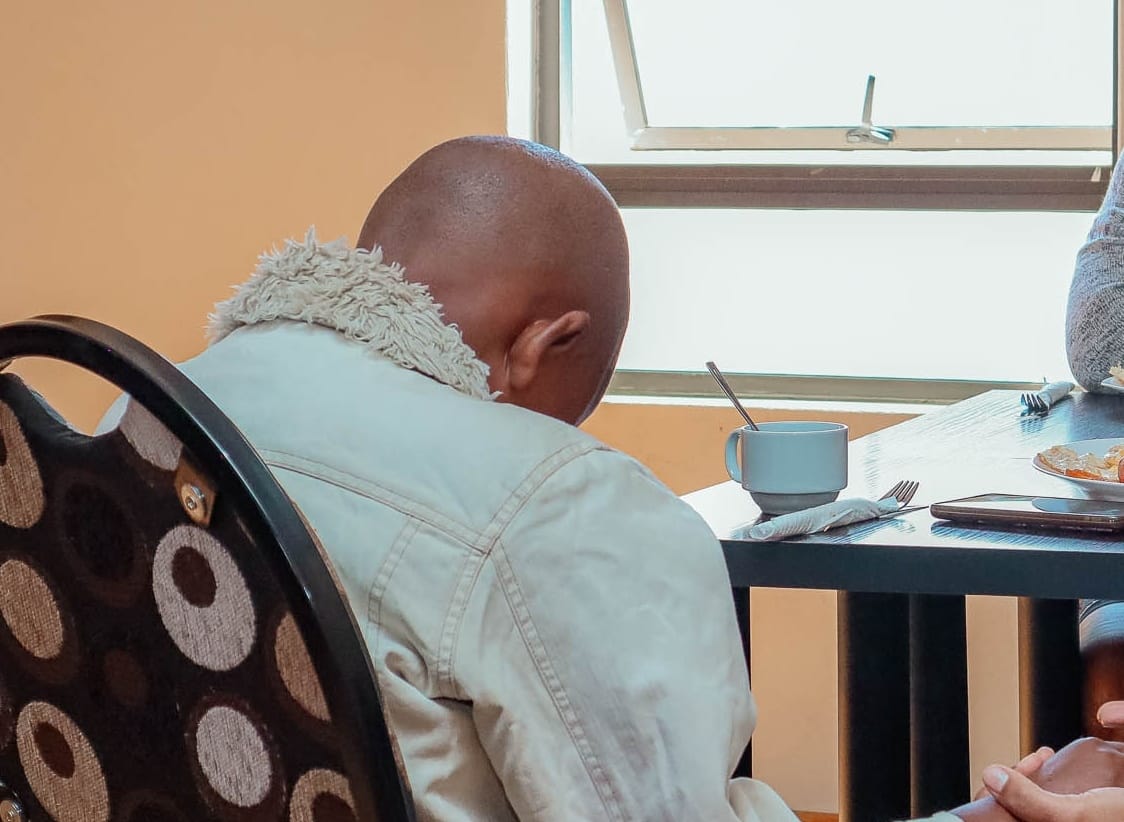Nicole Tau
Standing at any high point in Lesotho, you can almost always see South Africa. It feels like one can simply walk over there and start a new life. No borders, no fences, no visible guards, just plain South African plains. How can one want a better future for their children and not just take it when it’s right in front of them?
Dubbed “The Kingdom in the Sky”, Lesotho is the world’s only nation above 1,000 meters, a mountain fortress where poverty claws at grandeur.

South Africa completely encircles it, and its currency, the loti (plural: maloti), matches lockstep with the rand under the Common Monetary Area (CMA). Yet this economic tether fails to lift its people, 75% of whom are poor or vulnerably poor (Lesotho Poverty Assessment, 2019).
However, the brave Basotho women who take the chance to cross the border over to South Africa are now supporting families back in Lesotho. They are sending girls to school, taking care of the elderly, and ensuring the well-being of the families that depend on them.
The Thetsane Industrial Area pulses with the heartbeat of Lesotho’s economy. Rows of factories, like FORMOSA, hum even on weekends, their gates swallowing streams of workers. Most here live where they labor, but others trek for hours from Maseru’s surrounding villages, occasionally beginning their walks before sunrise.
By 5 AM, women balance their lunchbox containers of pap and morogo (any of the leafy green vegetables) as they hurry toward the factory floor.

Overlooking FORMOSA’s sprawling complex, Mamalefane Lethibela (50) sits beside her husband at a weekend-quiet taxi rank. Drivers still shout for passengers heading into town, but her gaze is fixed somewhere beyond the fences.
A pause hangs in the air before she unspools her story of years spent on the factory floors of Mandeni, South Africa, where the machines sounded the same, but the world felt foreign and full of opportunities.
In Durban’s Mandeni Industrial Zone, Mamalefane spent 2018 to 2024 sewing in a Chinese-owned factory. She earned roughly R1,000 a week, or more with overtime. Little by South African standards, but a lifeline in Lesotho. She sent remittances through Hello Paisa, an informal digital service that promised lower fees than Shoprite transfers but required lengthy vetting.
“It wasn’t easy to apply,” she explains. “You submit your documents, but sometimes the application gets declined. Others had theirs approved, so they helped us send money home. For us, it was the simplest way to send money. It felt like a real improvement, and we managed to make positive changes back at home.”
Mamalefane’s husband was unemployed when she left for South Africa, but found some work in her absence. However, although he tried to hold the family together, his meager earnings from doing odd jobs around Maseru couldn’t cover the family of five’s daily needs, including their deaf, special needs son, Katleho (21) and their ten-year-old grandson.
“When she was working in South Africa, her money was really helpful,” he says. “In South Africa, they were earning per week. The money in Lesotho was small and finished quickly, so we relied on her, that when things finished, she could assist.”
In 2023, Mamalefane brought her eldest daughter, Mantina (28), to join her in the factory at Mandeni.
“There was no work back in Lesotho. This was after the factories closed down due to COVID-19. She still works there now. Her money makes some changes because she’s able to put the kids through school and make sure that the food is there,” she says.

On the other side of the border in South Africa lives Matsepiso Makhabane.
Twenty-four years ago, Matshepiso left Lesotho for South Africa. Now 56, she wears multiple hats as an entrepreneur, energy specialist, and advocate for migrant women. Yet she still does not hold a South African ID.
“As soon as I say, ‘My name is Matsepiso Makhabane, Lesotho passport RA…,’ the attitude completely changes. It’s like you’re no longer a person, like you’re not one of them,” she says.
Matshepiso’s first taste of Johannesburg came in 2001, when she accepted a coveted energy policy post at a major organization. Married to a South African by civil law and traditionally, she assumed motherhood (all her three children are South African citizens) and her husband’s paperwork would grant her smoother legal status.
Instead, every permit hinged on his intermittent support. “Whenever I needed a police clearance to renew my permit, I had to depend on him. But he appeared and vanished; it was complicated.”
When her residency lapsed, she began making monthly pilgrimages to Maseru, six hours away, just to stamp out her passport.
“If I overstayed for two days, I would face a one to five-year ban. So, I would go home before the permit expires, even though it’s costly. You can imagine coming home all the way from Johannesburg every month before the stamp expires. It’s really costing me a lot.”
Today, Matshepiso leads The Green Business College, based in South Africa, an agro-processing and renewable energy training hub she acquired during the 2020 COVID lockdown. Her institute offers free or subsidized workshops to migrant women, equipping them with organic farming and agro-processing to sustain families in Lesotho.

“I wanted to give other migrant women back home in Lesotho something they could control despite the broken systems. I understand their plight,” she says. “After I make groups with them, I monitor their progress and encourage them. They are doing wonders. They learn to process food into jams and pickles, products they can sell.”
Such grassroots initiatives reveal a pattern of resourcefulness that rarely makes headlines: women leveraging informal networks to launch micro-enterprises, despite living without basic civil rights.
“When the government of Lesotho couldn’t be there for stranded Basotho in South Africa,” Mamalefane says. “Some of us across Lesotho formed a cooperative called ‘Moho Re Ka Atleha Basotho’ (Together We Basotho Can Succeed). The cooperative is now three years old. We pool small grants to help Basotho women in SA who need them. For example, those stranded at a South African hospital or to cover funeral costs.”
Bonang Libate (54), a mother of four, left Leribe’s garment factories in 2010 when wages couldn’t cover her children’s school fees. For four years, she labored as a domestic worker in Mpumalanga, sending every maloti back to her own mother, Rethabile, who cared for the children.

“I knew nothing of Johannesburg,” Bonang says, “Only that I had to provide.”
When school fees rose once more, Bonang returned home and rented a two-room dwelling with her grandchildren, her eldest daughter having also gone across the border to work in a factory. All four of her children have since completed Grade 12, defying national dropout rates driven by poverty and early marriage.
It was a friend’s tip that pushed her to travel alone to Pretoria’s sprawling townships, certain she had no choice. But migration is woven into the Libate family’s DNA. Bonang’s mother, Rethabile (70), once made the same pilgrimage in her youth. Bonang’s eldest daughter Hopolang has followed her mother’s path too, traveling to Durban in early 2023 to work.
“Hopolang is really helping me the most. She takes care of me. She makes sure that we eat, that the kids go to school and have clothes, that I am able to pay rent.”

Free migration is the backbone of survival in Lesotho, with 43% of households reporting at least one member who’s been working outside the country for decades. Remittances from Basotho migrant workers in South Africa have anchored Lesotho’s economy.
In 2023, this flow reached $485 million, 22.9% of GDP, making Lesotho Africa’s fourth most remittance-dependent nation, according to the World Bank’s Migration and Development Brief. Beneath this statistic lies the disproportionate role of Basotho women, who remit more of their income despite earning less, sustaining households while battling systemic challenges.
While specific remittance data for Basotho women migrants remains scarce, a critical trend reveals the invisible engine of female labor as mining jobs for Basotho men plummeted from 100,000 in 1990 to 40,500 by 2006, gutting traditional household incomes. Total remittances to Lesotho paradoxically increased (Migration, Remittances and Development in Lesotho, 2010).
This surge occurred alongside a documented rise in female migration, with women constituting half of Lesotho’s growing migrant flow to South Africa and 90% of the textile workforce within Lesotho itself, dubbed the ‘new miners’ despite paltry wages. The sustained remittance growth strongly indicates that female labor migration has become the crucial lifeline preventing economic collapse.

For decades, Basotho migration was synonymous with men trudging to South African mines. Remittances from male workers once underpinned Lesotho’s economy and defined gender roles at home. But the late 20th century brought mechanization, economic downturns, and stricter immigration policies, shrinking those male‑dominated corridors.
Retrenched Basotho mineworkers pursued various paths to survive, including starting businesses back home, taking up farming, finding new jobs within Lesotho, or remigrating again for other types of work (Return, reintegration and survival: The case of Basotho labor migrants retrenched from South African mines, 2013).
With male remittances vanishing, the exodus of women became necessary. By the 1980s, scholars noted an uptick in female migration. First, internally, then across the border. By 2018, 52% of cross-border migrants were female, many of them leaving children with grandparents or siblings to sew jeans in Maseru or clean homes in Durban.
| Metric | Women | Men | Source |
| Avg. Monthly earnings | R2,929 (Domestic) | R5,500 (Mining) | Stats SA, 2024 |
| Income Remitted | 60-80% | 30-50% | UN-INSTRAW/SAIIA |
| Households Supported | 93% buy food | 76% buy food | SAMP Study |
Women allocate 56% of remittances to school fees and uniforms vs. men’s 32%. Men invest 67% in livestock or property.
Migrant women make up 37.4% of SADC migrants to South Africa, dominating the informal sectors at 70% working as street vendors, domestic workers, or textile laborers (UN-INSTRAW/SAIIA). Although they earn 30-50% less than their male counterparts (e.g. R2,929/month vs. R5,500 for miners), they remit 60-80% of their income consistently.
Twelve SADC nations, including Lesotho, signed the Revised Protocol on Gender and Development, pledging “gender-responsive legislation” for migrants. South Africa and Lesotho’s 90-day visa-free agreement offers critical flexibility for Basotho to seek work or reunite with family without immediate deportation risks. Although temporary, this window is a lifeline for women escaping exploitation or pursuing opportunities.

Both governments are also negotiating portable social benefits, which are tricky to execute but a potential game-changer for mothers sending remittances home. If implemented, this would let migrants retain pensions, healthcare, and childcare support across borders. For Basotho women dominating informal sectors, this could mean safety nets beyond exploitative employers.
South Africa has a Family Reunification Visa option that allows the first kin (spouses/children) to secure permanent residency in South Africa, and second kin (siblings) to qualify for renewable temporary permits (SA Home Affairs). While financial requirements (R8,500/month) remain prohibitive for many, the framework exists, and migrant groups are pushing to expand eligibility.
The economic empowerment naturally shifts household dynamics. Basotho men must adapt to women as breadwinners, so decision‑making becomes more collaborative. As these women assert agency, they catalyze policy debates, inspire new forms of cross‑border collaboration, and reshape the narrative of migration in Southern Africa.
“My mother now handles most of the finances, and her strength has inspired all of us to work together,” says one of Bonang’s relatives in Maseru.
In Lesotho’s villages, open‑air meetings or traditional gatherings known as pitso convene to discuss migration’s impacts. There, Basotho blankets and mokorotlo hats lend cultural gravitas as advocates press for family‑friendly policies, secure labor rights, and cross‑border benefit portability. The message is that national security and economic growth must not eclipse human dignity and family unity.
Migrant Worker’s Association of Lesotho (MWA-Lesotho) Coordinator, Lekhema Ramaphiri, emphasizes that lipitso are vital to informing rural and highland communities about policies, rights, and critical issues like human trafficking. These gatherings also educate participants on local challenges, ensuring grassroots perspectives shape solutions.
You have read their journeys. Now step into their world. Watch the document below to see how Basotho women cross invisible borders, carry entire households and quietly power a nation
This content is produced as part of the Move Africa project, commissioned by the African Union Commission and supported by the Deutsche Gesellschaft für Internationale Zusammenarbeit (GIZ) GmbH. The views and opinions expressed are those of the authors only and do not necessarily reflect those of the GIZ or the African Union.
Summary
- The brave Basotho women who take the chance to cross the border over to South Africa are now supporting families back in Lesotho.
- A pause hangs in the air before she unspools her story of years spent on the factory floors of Mandeni, South Africa, where the machines sounded the same, but the world felt foreign and full of opportunities.
- The money in Lesotho was small and finished quickly, so we relied on her, that when things finished, she could assist.

Your Trusted Source for News and Insights in Lesotho!
At Newsday Media, we are passionate about delivering accurate, timely, and engaging news and multimedia content to our diverse audience. Founded with the vision of revolutionizing the media landscape in Lesotho, we have grown into a leading hybrid media company that blends traditional journalism with innovative digital platforms.









